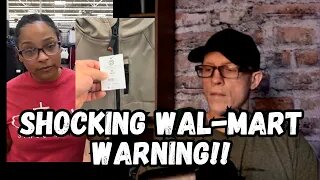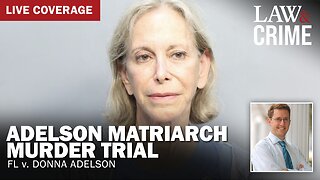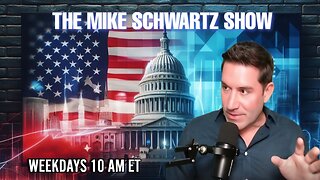Premium Only Content

The Secret Meeting That Broke Our Food System
The seed distribution program was enormously popular with farmers as public seed was free and of good quality.
It ... Congress eliminated the USDA seed distribution program in 1924.
The public’s access to seeds has been decreasing since a 1980 Supreme Court ruling that a life-form could be patented.
Since then, big seed companies have shifted away from open-pollinated seeds to patented hybridized and genetically engineered varieties.
The companies prohibit farmers from saving and replanting such seeds, requiring that they buy new seeds each year.
The American Seed Trade Association: Promoting the research, development and movement of quality seed to meet the world's demand for food, feed, fiber and fuel.
https://web.archive.org/web/20131004220704/http://www.amseed.org/about-asta/who-we-are/
The Seed Industry in U.S. Agriculture: An Exploration of Data and Information on Crop seed markets, regulation
https://web.archive.org/web/20130620013219/https://www.ers.usda.gov/media/260729/aib786_1_.pdf
History of Seed in the U.S.
The Untold American Revolution
https://www.centerforfoodsafety.org/files/seed-report-for-print-final_25743.pdf
Bowman v. Monsanto Co. (05/13/2013)
Seed Libraries and State Laws
Agriculture regulators in Minnesota and Pennsylvania warn libraries about their seed-sharing programs
https://americanlibrariesmagazine.org/2014/12/08/seed-libraries-and-state-laws/
Nonprofit, community-based seed libraries in Pennsylvania are not subject to the licensing, labeling and testing required of commercial seed distributors in the Seed Act of 2004, according to a clarification issued by the Pennsylvania Department of Agriculture.
A statewide coalition — led by the Pennsylvania Association for Sustainable Agriculture, Grow Pittsburgh, the Public Interest Law Center and members of the Pittsburgh Food Policy Council — worked with the Pennsylvania Department of Agriculture to clarify the Seed Act.
The act was originally applied to a seed library at the Joseph T. Simpson Library in Mechanicsburg, which severely limited its operations.
The number of seed libraries has surged in recent years.
According to the Association for Sustainable Agriculture, there are an estimated 26 seed libraries across the Commonwealth, with more than 350 nationwide.
Seed Libraries – Draft Protocol
I. Library procures licensed and properly labeled seed to give away to its patrons.
How the library assembles this initial Seed Library is up to them
o solicit patrons, local volunteer groups, social groups, churches, etc. for seed
packets meeting their specifications
(traditional, heirloom, organic, ect.)
o monetary donations to purchase seeds from local retail stores in community.
o seeds donated by local retail stores or seed distributors
What is AASCO?
The Association of American Seed Control Officials is an organization of seed regulatory officials from the United States and Canada. The Association was organized in 1949, from an outgrowth of regional meetings held in various parts of the United States.
The members meet annually to discuss mutual concerns of seed law enforcement, to be updated on new developments in the seed industry, and to update the Recommended Uniform State Seed Law (RUSSL)
which the organization developed and maintains as a "model" law for states and federal programs.
Homework: Nonprofit seed libraries don't require license
AB 1810
Implementation
Behavioral Health Education Series
Episode One
Seeds are at the foundation of human and animal existence on this planet. Since the dawn of agriculture, over 10,000 years ago, human have domesticated, bred, and selected plant varieties that provide us with nourishment.
https://www.theselc.org/save_seed_sharing
September 9, 2016 - California Governor signs into law CA Seed Exchange Democracy Act, exempting noncommercial seed sharing from testing and labeling requirements in the state seed law.
https://www.theselc.org/governor_brown_signs_seed_exchange_democracy_act
August 16, 2016 - Illinois passes amendment to state seed law to exempt seed libraries from state seed law requirements.
July 17, 2016 - At the 35th annual Seed Savers Exchange Conference & Campout, the steering committee of the International Seed Library Association reach an agreement with Seed Savers Exchange and USC-Canada to create the Community Seed Network as a joint project to support the national seed library community.
July 14, 2016 - AASCO votes to adopt an amendment, initially introduced by the Law Center and negotiated with several stakeholders, to the Recommended Uniform State Seed Law that creates exemption from testing, permitting, and most labeling requirements, creating replicable language that state legislatures can draw from when updating state seed laws.
https://d3n8a8pro7vhmx.cloudfront.net/theselc/pages/458/attachments/original/1471306626/20160714_-_Noncommercial_Seed_Sharing_RUSSL_Amendment_(as_adopted).pdf?1471306626
July 15, 2015 - The Law Center staff attend national gathering of American Association of State Seed Control Officials (AASCO) to advocate for changes to model legislation that creates exemption from testing, permitting, and labeling requirements for noncommercial seed sharing initiatives.
The amendment is not accepted, but a working group is created to develop amended language including representatives from AASCO, SELC, seed libraries, and seed companies.
May 27, 2015 - Nebraska Governor signs into law legislation that exempts seed libraries from state seed law.
May 19, 2015 - Minnesota becomes the first state to pass a law amending the state seed law to exempt noncommercial seed sharing from testing, labeling, and permitting requirements, based on language developed by Sustainable Economies Law Center.
May 3-6, 2015 - First-ever International Seed Library Forum is held in Tucson, Arizona, hosted by the Pima County Public Library to bring together over 100 seed advocates to discuss the state of the seed library movement, state seed laws, and develop strategies for growing the national and international network of community-based seed sharing. The participants unanimously adopt a Joint Resolution in Support of Seed Libraries.
The Law Center begins advising steering committee on creation of a backbone organization to support seed libraries, tentatively called the International Seed Library Association.
November 11, 2014 - With support from the Clif Bar Family Foundation, the Law Center launches the Save Seed Sharing campaign with national online petition to spread awareness and build support for legal protections for seed libraries and other community-based seed sharing initiatives. The petition eventually receives over 20,000 signatures.
August 11, 2014 - The Law Center co-publishes article with Shareable and Center for a New American Dream outlining the need to change state seed laws to protect community-based seed sharing activities.
http://www.shareable.net/blog/setting-the-record-straight-on-the-legality-of-seed-libraries
The Law Center also launches the Seed Law Tool Shed, a publicly accessible, crowdsourced database of state seed laws and analysis.
https://github.com/neilthapar/Seed-Law-Tool-Shed
June 12, 2014 - Pennsylvania Department of Agriculture sends letter to Simpson Library in Mechanicsburg, informing the library staff that their plans to open a seed library violate the state seed law.
With little notice, more than two dozen state legislatures have passed “seed-preemption laws”
designed to block counties and cities from adopting their own rules on the use of seeds,
including bans on GMOs.
Opponents say that there’s nothing more fundamental than a seed, and that now, in many parts of the country,
decisions about what can be grown have been taken out of local control and put solely in the hands of the state.
https://www.ecosnippets.com/environmental/29-states-banned-laws-about-seeds/
The Long, Politically Fraught History of Seeds in the U.S.
We’ve come a long way from the government giving away free seeds.
https://www.atlasobscura.com/articles/the-long-politically-fraught-history-of-seeds-in-the-us
December 1, 2021 Office of the United States Trade Representative
Dec 1, 2021While the U.S. seed industry was successful in receiving an initial exclusion for products, since August 8, 2020, American companies have been required to pay a 25% tariff on their imported seed products from China.
https://www.betterseed.org/
NO FREE SEEDS. - The New York Times
https://www.nytimes.com/1923/01/14/archives/no-free-seeds.html
UNITED STATES PLANT VARIETY PROTECTION ACT
https://www.ams.usda.gov/sites/default/files/media/Plant%20Variety%20Protection%20Act.pdf
Plea for Free Seeds Fails in the Senate, So There Will Be No Distribution This Year
29 States Just Banned Laws About Seeds…
https://www.ecosnippets.com/environmental/29-states-banned-laws-about-seeds/
ASTA-Letter-on-Section-301-Tariffs-Impacting-US-Seed-Industry
The Effect of Breeders' Rights on the Seed Trade
https://acsess.onlinelibrary.wiley.com/doi/abs/10.2134/asaspecpub3.c9
Meet the Microbes Eating the Gulf Oil Spill [Slide Show]
https://www.scientificamerican.com/slideshow/gulf-oil-eating-microbes-slide-show/
Monsanto Sues Farmers for 16 Yrs over GMOs, NEVER Loses
https://naturalsociety.com/monsanto-sued-farmers-16-years-gmos-never-lost/
Monsanto wrongly sued farmers for patent infringement? Federal courts put down David v Goliath myth for good
Monsanto sued small farmers to protect seed patents - report
https://www.theguardian.com/environment/2013/feb/12/monsanto-sues-farmers-seed-patents
The lawsuit representing over 300,000 farmers who wanted the right to grow organic food was also dismissed on the grounds that the plaintiffs had been sued by Monsanto! The judge said the farmers’ reasons for suing the biotech giant were ‘unsubstantiated.’ When Monsanto released a statement to the press, they said the plaintiffs had:
“overstate[d] the magnitude of [Monsanto’s] patent enforcement,” noting that Monsanto’s average of roughly 13 lawsuits per year “is hardly significant when compared to the number of farms in the United States, approximately 2 million.”
Monsanto Lawsuits Pile Up as American Farmers Demand Rights
Monsanto legal cases - Wikipedia
https://en.wikipedia.org/wiki/Monsanto_legal_cases
Years After Monsanto Deal, Bayer's Roundup Bills Keep Piling Up
https://www.nytimes.com/2023/12/06/business/monsanto-bayer-roundup-lawsuit-settlements.html
chakrabarty vs diamond case study pdf
Forty Years Since Diamond v. Chakrabarty: Legal Underpinnings and its Impact on
the Biotechnology Industry and Society
https://cip2.gmu.edu/wp-content/uploads/sites/31/2021/01/Forty-Years-Since-Diamond-v-Chakrabarty.pdf
Food insecurity, the forgotten crisis of COP28
When it comes to climate change,
the world’s food system is a double-edged sword. Food production is both one of the biggest emitters of global greenhouse gases and one of the sectors hardest hit by the effects of climate change.
To reconcile these two issues,
the UN’s Food and Agriculture Organization on Sunday set out an unprecedented roadmap for solutions. But the topic rarely makes it to the negotiating table.
https://www.france24.com/en/environment/20231212-food-insecurity-the-forgotten-crisis-of-cop28
Now, you might be wondering to yourself, “Wait, $45 billion? How? Can’t commercial farmers just use the seeds left over by the plants they grow?”
Well, this issue is way more complicated than that. And, largely, you can thank genetically modified crops, and, more specifically, the 1980 Supreme Court case that paved the way for them.
In Diamond v. Chakrabarty, the court then affirmed (in a narrow 5-4 decision) that genetically modified organisms, or GMOs, could be patented, setting the stage for the rise of seed industry giants.
“While laws of nature, physical phenomena, and abstract ideas are not patentable, respondent’s claim is not to a hitherto unknown natural phenomenon, but to a non-naturally occurring manufacture or composition of matter—a product of human ingenuity ‘having a distinctive name, character [and] use,” Chief Justice Warren E. Burger wrote.
This decision, while involving a form of bacteria that could break down crude oil, proved a major turning point for the seed industry, and allowed GMOs to propagate widely.
This is the seed, in other words, that allowed the agricultural company Monsanto to grow into a multi-national giant.
It’s also quite the change from the time when the federal government used to seeds away for free.
No, really. They did that.
When the American Seed Trade Association got its start in the late 1800s, the seed business was far from the massive success it is today. In fact, prior to its launch, many seed companies went under.
The culprit?
The federal government, who spent nearly a century giving away seeds for free through a variety of organizations, starting with the agricultural arm of the U.S. Patent Office,
eventually giving way to the USDA upon its 1862 founding.
For nearly a century, the federal government was organized around the reality of the economy, which is that it was still strongly agrarian. Many early post offices were hubs for picking up seeds.
It wasn’t a cheap program, either:
At one point in the late 1800s, roughly a third of the USDA’s budget was dedicated to distributing seeds around the country.
And some political parties wanted the seed program to go even further.
All of this, though, didn’t stop more seed companies from starting up, despite the long odds for success.
Eventually, the American Seed Trade Association was formed in 1883, with the free seed program the companies’ primary issue.
It took a few decades of lobbying,
but in 1924, things finally changed in their favor, when Congress ended the free-seed program.
Around that time, the seed industry came up with its first hybrid corn seed, which helped make the case that the commercial market could create seeds that produced better yields than the federal government. That helped set the stage for the commercial farming and food industry we have today.
To this day, commercial seed-growers understandably see the early period as the “bad old days,” and, in modern times, are still fighting for their right to monetize their seeds.
Take a 2013 Supreme Court case Bowman v. Monsanto Co., which pitted Monsanto against a farmer who wanted to reuse his genetically modified seeds.
The seed industry argued that the government’s free seed program ultimately harmed the seed industry by removing incentives for farmers to develop their seeds, and therefore, their crops.
Early seed breeders had little incentive to make costly investments in developing more productive plants because the free seed program crowded private breeders from the marketplace,” the brief, filed by 21 different industry organizations, stated. “Additionally, without intellectual property protection, seed breeders had little control over the fate of their genetic material; purchasers were not barred from saving seed or from selling the new seeds they grew to others for planting purposes without compensating the breeder.”
(The Supreme Court ultimately sided with Monsanto in a unanimous decision, finding that seeds remain patented even after you re-grow them.)
We may not have federally mandated free-seed programs anymore, but one thing we do have more of now than we did in 1862? Libraries.
And some of those libraries, more than 300 in the U.S. alone, are in the seed business.
Seed libraries, or grassroots-level seed exchange programs, generally work like this: you pick up the seeds you need, grow something in your garden, then when you’re done, you return some seeds back to the library. It’s a good idea, but the problem is, the practice is illegal in some states due to broadly-written agricultural legislation—legislation that, in many cases, also bans you from exchanging seeds with friends.
There has been at least one case, in fact, where a state agriculture department came down hard on a library for the heinous crime of seed-sharing.
In 2014, the Pennsylvania Department of Agriculture told a library in Mechanicsburg that they were in violation of a 2004 state law because they allowed people to plant seeds from the library, with the promise that they’d offer up new seeds from fully grown plants later on. The department told the library that this was a bad idea—the seeds had to be tested, had to come directly from commercial seed companies, and at the end of the growing season, all the extra seeds had to be thrown away.
“What they proposed to do at the library fell under the definition of seed distribution, and if you’re a seed distributor, you fall under the provisions of the act,” Deputy Agriculture Secretary Jay Howes told the Wall Street Journal.
When discussing the issue, Cumberland County Commissioner Barbara Cross suggested that the seed library created a legitimate threat to the food supply, and that it was important to get on top of the issue while it was still relatively manageable. She also managed to introduce the word “terrorism” to the conversation.
“Agri-terrorism is a very, very real scenario,” she told the Sentinel. “Protecting and maintaining the food sources of America is an overwhelming challenge … so you’ve got agri-tourism on one side and agri-terrorism on the other.”
Eventually, the library made a deal with the state—it would no longer let gardeners bring seeds back to the library, and would only sell donated seeds from corporations. Crisis averted, apparently.
Fortunately, there are organizations that have been working on this issue. One of them is the Sustainable Economies Law Center, a legal group focused on environmental issues.
They have been active in lobbying for updated laws and exceptions to the laws currently on the books for seed libraries around the country, particularly in California, where the group worked to get AB 1810
on the books—successfully, as the act was signed into law back in September. The law clarifies that seed sharing laws are not meant to cover non-commercial exchanges like libraries.
As for Pennsylvania, there’s some good news on that front as well:
Earlier this year, the state’s agriculture department clarified that non-commercial seed exchanges were not covered by the state’s Seed Act of 2004,
which allowed the library in Mechanicsburg can go back to exchanging seeds without any corporate influence.
Brian Snyder, the head of the Pennsylvania Association for Sustainable Agriculture, welcomed the change of heart by the state.
While Snyder said the law had its place, it was necessary to clarify it wasn’t intended for grassroots-level gardeners.
“Seeds are a basic element of human life and wellbeing,” Snyder said. “Without this kind of informal cooperation among neighbors, that well-being is very much at risk.”
When you see a law enforced in what seems like an unfair way, we recommend reading the letter of the law to see if you can find any holes in it. We did just that, and found one! In Pennsylvania,
supplying seed likely makes you subject to the requirement to get a license, which involves filling out a form and paying an annual $25 fee (Section 7103, Chapter 71 of Pennsylvania Consolidated Statutes).
However, the sections of the law (7104, 7105, etc.) that mandate testing and labeling only apply if you sell seed. Not “supply,” but “sell!”
original link found on More Perfect Union
-
 10:46
10:46
Watchman's Duty
14 days agoPeople are Discovering Shocking Pricing Tricks at Wal-Mart
1.08K5 -
 LIVE
LIVE
Law&Crime
2 hours ago $1.06 earnedLIVE: Adelson Matriarch Murder Trial — FL v. Donna Adelson — Day 9
337 watching -
 LIVE
LIVE
Matt Kohrs
11 hours agoMASSIVE Market Swings Incoming! || Top Futures & Options Trading Show
637 watching -
 LIVE
LIVE
Wendy Bell Radio
5 hours agoIt's All About the Benjamins
7,399 watching -
 LIVE
LIVE
JuicyJohns
2 hours ago $2.89 earned🟢#1 REBIRTH PLAYER 10.2+ KD🟢
87 watching -
 3:18:50
3:18:50
Times Now World
4 hours agoLIVE: NATO Chief Demands 5% of GDP for War Chest! Mark’s Bold Plan for Allies at IISS Prague Defence
20.2K1 -
 15:54
15:54
IsaacButterfield
5 hours ago $0.36 earnedAustralians BANNED from Taking Photos at Uluru
4.35K7 -
 LIVE
LIVE
The Mike Schwartz Show
1 hour agoTHE MIKE SCHWARTZ SHOW with DR. MICHAEL J SCHWARTZ 09-04-2025
4,126 watching -
 LIVE
LIVE
LFA TV
3 hours agoLFA TV ALL DAY STREAM - THURSDAY 9/4/25
4,157 watching -
 1:16:35
1:16:35
JULIE GREEN MINISTRIES
4 hours agoGOVERNMENTS AROUND THE WORLD ARE ABOUT TO COLLAPSE
81K138